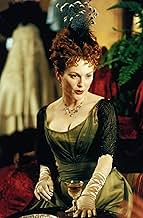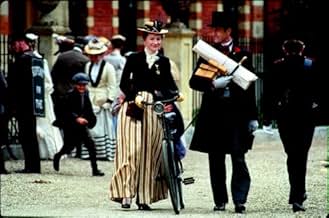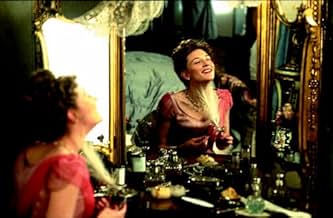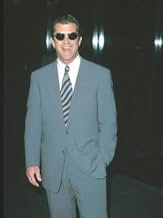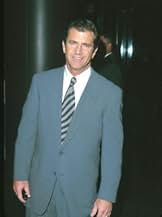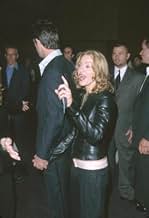Londra 1895, il ministro di Gabinetto, Sir Chiltern, e lo scapolo, Lord Goring, sono vittime d'intrighi di donne.Londra 1895, il ministro di Gabinetto, Sir Chiltern, e lo scapolo, Lord Goring, sono vittime d'intrighi di donne.Londra 1895, il ministro di Gabinetto, Sir Chiltern, e lo scapolo, Lord Goring, sono vittime d'intrighi di donne.
- Regia
- Sceneggiatura
- Star
- Nominato ai 3 BAFTA Award
- 4 vittorie e 17 candidature totali
Recensioni in evidenza
7=G=
"An Ideal Husband" is a charming though contrived little 19th century English period comedy with the subtly sardonic sense of humor typical of Oscar Wilde. The film, which deals with the politics of society first, the politics of the heart second, and the politics of the state last, features all the trappings of the period, a solid cast, and a clever script. An amusing and enjoyable watch for those into 19th century English period films.
If I weren't so lazy, I would have checked the original play to see if my favorite line from the movie was in it:
Goring's father: I use nothing but my common sense. Goring: So my mother tells me.
Even if was concocted for the film, that line still contains the essence of Wilde and the essence of all modern British humor, for which, I should say, I'm a major sucker. While watching An Ideal Husband, I didn't object to the lack of suspense as long as Rupert Everett was working his way around those Wilde lines, which he does as well as anyone I've ever heard.
I used to think Stephen Fry was Wilde on earth, but Fry is something wonderfully different -- Everett is Wilde on earth, or at least the actor that Wilde should have had around to deliver those lines when he wrote them. I first saw Everett in The Madness of King George, for which he put on weight. Every review of that film mentioned this; I thought the attention excessive, but when I saw him lying shirtless in a sauna, I understood. The man is, shall we say, cut. I can only imagine the effect of that scene on straight women or gay men -- probably something akin to the effect Greta Scacchi's "I think we're alone now" smile at the end of The Coca-Cola Kid has on me.
An Ideal Husband is full of good performances, with one glaring exception: the usually great Julianne Moore. Her scenes are curiously leaden, and Parker -- whose fault this may be -- has the camera linger over her as though the exposure will convince us how evil she is. The one exception is her scene with Everett, which has a real "Will he sleep with the enemy?" tension. It may be that Moore was just outclassed by the Brits, who are born to this stuff.
Cate Blanchett, whom I've seen in three movies, two of which were British period pieces, continues to amaze me with her range.
The unsung hero of the movie is Jeremy Northam, who takes a thankless role -- the man in the play who isn't the Oscar Wilde figure -- and makes it emotionally compelling. He is responsible for the play's only real suspense and emotion, since the rest is word games, more or less.
All of which leads me to blame the production's shortcomings on its writer/director, Oliver Parker. He seems to have squandered an outstanding cast. The play's final scene is played as a series of French scenes -- a film term for a series of different scenes in the same location -- and this kills any momentum that scene might have had.
Three out of four stars, I say, which makes it better than 90% of the movies out there.
Goring's father: I use nothing but my common sense. Goring: So my mother tells me.
Even if was concocted for the film, that line still contains the essence of Wilde and the essence of all modern British humor, for which, I should say, I'm a major sucker. While watching An Ideal Husband, I didn't object to the lack of suspense as long as Rupert Everett was working his way around those Wilde lines, which he does as well as anyone I've ever heard.
I used to think Stephen Fry was Wilde on earth, but Fry is something wonderfully different -- Everett is Wilde on earth, or at least the actor that Wilde should have had around to deliver those lines when he wrote them. I first saw Everett in The Madness of King George, for which he put on weight. Every review of that film mentioned this; I thought the attention excessive, but when I saw him lying shirtless in a sauna, I understood. The man is, shall we say, cut. I can only imagine the effect of that scene on straight women or gay men -- probably something akin to the effect Greta Scacchi's "I think we're alone now" smile at the end of The Coca-Cola Kid has on me.
An Ideal Husband is full of good performances, with one glaring exception: the usually great Julianne Moore. Her scenes are curiously leaden, and Parker -- whose fault this may be -- has the camera linger over her as though the exposure will convince us how evil she is. The one exception is her scene with Everett, which has a real "Will he sleep with the enemy?" tension. It may be that Moore was just outclassed by the Brits, who are born to this stuff.
Cate Blanchett, whom I've seen in three movies, two of which were British period pieces, continues to amaze me with her range.
The unsung hero of the movie is Jeremy Northam, who takes a thankless role -- the man in the play who isn't the Oscar Wilde figure -- and makes it emotionally compelling. He is responsible for the play's only real suspense and emotion, since the rest is word games, more or less.
All of which leads me to blame the production's shortcomings on its writer/director, Oliver Parker. He seems to have squandered an outstanding cast. The play's final scene is played as a series of French scenes -- a film term for a series of different scenes in the same location -- and this kills any momentum that scene might have had.
Three out of four stars, I say, which makes it better than 90% of the movies out there.
It's quite a long time that i haven't seen such a perfect movie: a highly talented cast, a lavishing setting and a finely chiseled and powerful script.
Here, you got an all-star team: Driver as the eccentric but romantic young woman (unfortunately a falling star that hasn't shine for a long time), Moore as the Machiavellian lonely woman, Everett as the helpful friend, "Sir Robert" as the courageous man and ... Blanchet as the lovely wife whom characterization deeply moved me. In my tumultuous life, i was just wondering what's the special gift a woman can offer (me) to fall in love: beauty, wit, sensuality, wealth, power? Gertrude has nothing of that but her kindness, her attention, her devotion left me under the spell. She could become easily my ideal wife.
Then, the story happens in the Victorian time for which i have also a strong tie. I just really appreciate the British phlegm: you can say the more vile things but always with class. Here, you find cupidity, blackmail, lies, ambition but there's nor a fight nor a shout!
At last, the script is really well written: you don't know if this is a romance, a buddy movie, a thriller or a tragedy. I really like the morals questions the movie asks: can a bad action be redeemed? How can a true friend be helpful? Does love live with lies? The answers are not brought in a dull, academic patronizing way but playfully because all the characters seems to orbit around each other!
In conclusion, it's a sort of lighter and happier "Carlito's way" thus a great movie that is maybe really unknown.
Here, you got an all-star team: Driver as the eccentric but romantic young woman (unfortunately a falling star that hasn't shine for a long time), Moore as the Machiavellian lonely woman, Everett as the helpful friend, "Sir Robert" as the courageous man and ... Blanchet as the lovely wife whom characterization deeply moved me. In my tumultuous life, i was just wondering what's the special gift a woman can offer (me) to fall in love: beauty, wit, sensuality, wealth, power? Gertrude has nothing of that but her kindness, her attention, her devotion left me under the spell. She could become easily my ideal wife.
Then, the story happens in the Victorian time for which i have also a strong tie. I just really appreciate the British phlegm: you can say the more vile things but always with class. Here, you find cupidity, blackmail, lies, ambition but there's nor a fight nor a shout!
At last, the script is really well written: you don't know if this is a romance, a buddy movie, a thriller or a tragedy. I really like the morals questions the movie asks: can a bad action be redeemed? How can a true friend be helpful? Does love live with lies? The answers are not brought in a dull, academic patronizing way but playfully because all the characters seems to orbit around each other!
In conclusion, it's a sort of lighter and happier "Carlito's way" thus a great movie that is maybe really unknown.
To say that this film is a filmmaking tour de force would be a great injustice. It is far better than that. Oliver Parker's revitalizing of Oscar Wilde's classic play is filmmaking at its finest.
Every element of this film is superlative. Wilde's story as adapted to the screen by Parker is witty, intelligent and engaging from start to finish. Seldom can you find a story that attempts to be a romantic comedy, a tale of duplicity blackmail and betrayal, and a drama of political intrigue, and succeeds so well on all counts.
The intricate weave of deception, manipulation and double entendre along with comic misperception, irony and rapier witted dialogue are delicious and classic Wilde. This is a film you will want to see again and again, just to discover all the lines within the lines.
I cannot say enough about the brilliance of Oliver Parker's direction in this film. He has captured late 19th Century aristocratic England with vivid and rich images that put the viewer right into the period. David Johnson's cinematography is fantastic, with every scene working well as to lighting and color. The beautiful blend of colors in the costumes and the set always looked like they belonged together. Parker also provides numerous interesting camera angles that help dramatize the scenes. It serves to remind us that glorious films can still be made relying on the creative eye of the director rather than special effects.
The acting was delightful. Rupert Everett, as the self absorbed Lord Arthur Goring, delivers an exquisite performance as the unscrupulous rogue upon whom the mantle of truth and honor is laid.
Julianne Moore was delightful as the evil and cunning Mrs. Cheveley. As cold, manipulative and heartless as she is with Chiltern and Lady Chiltern, she is that vulnerable and helpless with Lord Goring, for whom she has long held a flame. Moore handles this emotional juggling act with great skill and you find yourself simultaneously loving her ingeniousness and hating her treachery.
Cate Blanchett turns in another wonderful performance as the oh-so-perfect, Lady Gertrud Chiltern. Jeremy Northam is also excellent as Robert Chiltern, the man of untouchable character with a scandalous secret in his past. Even Minnie Driver is charming as Robert's sister.
This is a terrific film for the refined viewer who appreciates all aspects of filmmaking. Even for those not into the art of filmmaking, it is simply great entertainment. I can think of no negative criticism of it. It is well written, directed, photographed and acted. It is filmmaking the way it was meant to be. A perfect 10.
Every element of this film is superlative. Wilde's story as adapted to the screen by Parker is witty, intelligent and engaging from start to finish. Seldom can you find a story that attempts to be a romantic comedy, a tale of duplicity blackmail and betrayal, and a drama of political intrigue, and succeeds so well on all counts.
The intricate weave of deception, manipulation and double entendre along with comic misperception, irony and rapier witted dialogue are delicious and classic Wilde. This is a film you will want to see again and again, just to discover all the lines within the lines.
I cannot say enough about the brilliance of Oliver Parker's direction in this film. He has captured late 19th Century aristocratic England with vivid and rich images that put the viewer right into the period. David Johnson's cinematography is fantastic, with every scene working well as to lighting and color. The beautiful blend of colors in the costumes and the set always looked like they belonged together. Parker also provides numerous interesting camera angles that help dramatize the scenes. It serves to remind us that glorious films can still be made relying on the creative eye of the director rather than special effects.
The acting was delightful. Rupert Everett, as the self absorbed Lord Arthur Goring, delivers an exquisite performance as the unscrupulous rogue upon whom the mantle of truth and honor is laid.
Julianne Moore was delightful as the evil and cunning Mrs. Cheveley. As cold, manipulative and heartless as she is with Chiltern and Lady Chiltern, she is that vulnerable and helpless with Lord Goring, for whom she has long held a flame. Moore handles this emotional juggling act with great skill and you find yourself simultaneously loving her ingeniousness and hating her treachery.
Cate Blanchett turns in another wonderful performance as the oh-so-perfect, Lady Gertrud Chiltern. Jeremy Northam is also excellent as Robert Chiltern, the man of untouchable character with a scandalous secret in his past. Even Minnie Driver is charming as Robert's sister.
This is a terrific film for the refined viewer who appreciates all aspects of filmmaking. Even for those not into the art of filmmaking, it is simply great entertainment. I can think of no negative criticism of it. It is well written, directed, photographed and acted. It is filmmaking the way it was meant to be. A perfect 10.
I saw "An Ideal Husband" at the Old Vic theater in London, and was surprised at the time how timely a 100 year old play could be.
When I saw the trailers, TV ads and posters for this version, it seemed like an entirely different story--will Rupert Everett get married off. That's certainly a thread in the movie, but in the marketing of this version, they made it appear as if it was the entire wardrobe.
I didn't see the film when it was in theaters because these ads, with their very modern music and fast cutting, made the film look like a joke.
But when it came out on video, I decided to try it, and am glad I did.
The film itself is excellent. Beautifully shot and paced, with an expert cast. Wilde's humor shines through, and the writer-director has done a wonderful job "opening" up the play into a film, without changing anything important. It's a masterful job of translating from stage to screen. It's really so crisply done, and very funny.
In years to come people will realise that this is a fine movie version of this play. And by then, hopefully, they will have either forgotten about the marketing campaign, or hopefully learned from it.
I recommend the film.
When I saw the trailers, TV ads and posters for this version, it seemed like an entirely different story--will Rupert Everett get married off. That's certainly a thread in the movie, but in the marketing of this version, they made it appear as if it was the entire wardrobe.
I didn't see the film when it was in theaters because these ads, with their very modern music and fast cutting, made the film look like a joke.
But when it came out on video, I decided to try it, and am glad I did.
The film itself is excellent. Beautifully shot and paced, with an expert cast. Wilde's humor shines through, and the writer-director has done a wonderful job "opening" up the play into a film, without changing anything important. It's a masterful job of translating from stage to screen. It's really so crisply done, and very funny.
In years to come people will realise that this is a fine movie version of this play. And by then, hopefully, they will have either forgotten about the marketing campaign, or hopefully learned from it.
I recommend the film.
Lo sapevi?
- QuizWhen Mrs. Chevely discovers Gertrude's letter, it is laying atop a yellow book with an Aubrey Beardsley illustration on the cover. This is apparently a copy of The Yellow Book, which was a Victorian magazine of sorts. When Oscar Wilde was arrested on charges of sodomy in 1895, he was carrying what appeared to be The Yellow Book, and because of this association, the publication was ruined.
- BlooperAt the reception at the Chiltern's home, Sir Robert is requested to meet the Indian Ambassador. In 1895 India was a British possession and there could not be such an Ambassador who represents only independent states.
- Citazioni
Lord Caversham: What are you doing here, sir? Wasting your time, as usual?
Lord Arthur Goring: My dear father, when one pays a visit, it is for the purpose of wasting other people's time and not one's own.
- Curiosità sui creditiThe credits list Oliver Parker, the director, as playing "Bunbury", one of the gentlemen that is seen playing cards with Lord Goring in the Men's Club when Lord Chiltern arrives. Bunbury is also a never-seen character in "The Importance of Being Earnest", the play which is performed in the background of several scenes of this film.
I più visti
Accedi per valutare e creare un elenco di titoli salvati per ottenere consigli personalizzati
- How long is An Ideal Husband?Powered by Alexa
Dettagli
- Data di uscita
- Paesi di origine
- Sito ufficiale
- Lingua
- Celebre anche come
- An Ideal Husband
- Luoghi delle riprese
- Aziende produttrici
- Vedi altri crediti dell’azienda su IMDbPro
Botteghino
- Budget
- 14.000.000 USD (previsto)
- Lordo Stati Uniti e Canada
- 18.542.974 USD
- Fine settimana di apertura Stati Uniti e Canada
- 192.802 USD
- 20 giu 1999
- Lordo in tutto il mondo
- 18.542.974 USD
- Tempo di esecuzione
- 1h 37min(97 min)
- Mix di suoni
- Proporzioni
- 1.85 : 1
Contribuisci a questa pagina
Suggerisci una modifica o aggiungi i contenuti mancanti


